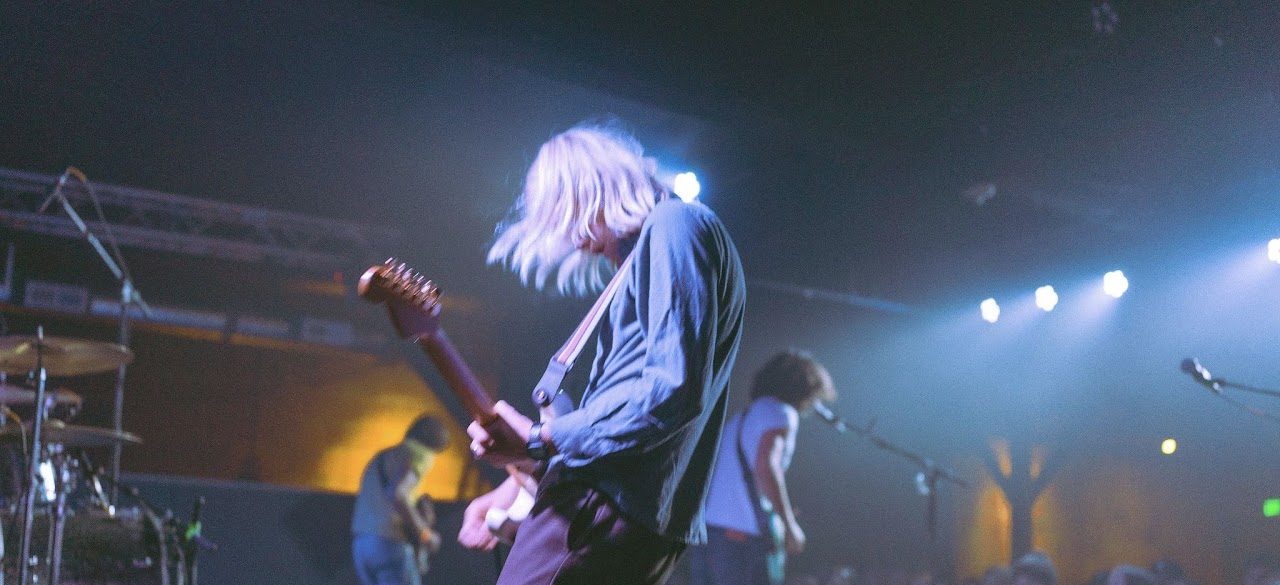We sat down with Blood Lemon, an all-women alternative band from Boise, Idaho before their Salt Lake City show at the DLC on Jan. 24. Blood Lemon is composed of drummer Lindsey Lloyd, guitarist Lisa Simpson and Built to Spill’s Melanie Radford on bass.
The following is a transcript of writers Maci Monaghan and Elizabeth Griffee’s pre-show coffee shop interview with the Boise-based trio.
Blood Lemon Origin
Elizabeth: How long have you guys been playing music together?
I think we started in late 2018. Yeah, I think we started in October.
Elizabeth: What brought you guys together?
Melanie: We were fans of each other’s work, all three of us have been in other bands and involved in the Boise music scene for a really long time, and we’ve just been fans of each other’s work and had a lot of mutual respect for each other. And we just wanted to work with more women.
Maci + Elizabeth: That’s beautiful. I like that purpose of admiring each other, that’s super sick. But independently have you guys pretty much been doing music for your entire lives, or how long before Blood Lemon?
Lisa: Yeah, it doesn’t necessarily pay the bills, but I’ve been playing since I was 16, recording since I was probably about 20. I did a lot of solo stuff first and then played another band before this one.
Maci: Yeah, you’ve been on it for a while. Since 2006 right?.
Yeah, sometimes when people are like, ‘How long have you been playing guitar?’-I’m like, I can’t even remember. Yeah, long time, long time..
Dave Catching, “Petite Deaths” and Sexuality in Music
Maci: Your EP is called “Petite Deaths.” What does this title mean?
Lisa: The first track, “High Tide,” we had taken the title from that. It’s a song that explores sensuality and what have you. In French, it’s a euphemism for an orgasm, so it’s also like a rebirth too, when you think about it. There was kind of an exploration of what different idioms are used throughout the world, and then applying them to that song. I think it [rebirth] is explored throughout the album in a lot of ways.
Melanie: The songs are all kind of epic in their own right and have huge bursts of a big climax of pleasure or despair. Petite Deaths just perfectly captured the whole thing.
Elizabeth: The album absolutely felt powerful in that sense. And reading on the connections between your themes was super interesting. In what ways do you guys feel like music can channel sensual feelings and sexuality? When you’re referring to these concepts of climax, pleasure and despair, is that separate from sexuality?
Melanie: I think it can be together and separate, you know.
Lisa: I think that, you know, one of the things that for me, personally, came out of lockdowns and COVID and sort of being separated from other people was that I got back into reading. I’ve always been kind of a voracious reader and I just really got into contemporary romance. It’s really cool because there’s just so many amazing stories out there. Not just Cis/Hetero couples, which is beautiful and wonderful, but there’s all kinds of stuff. There’s so much breath to contemporary romance as a genre.
I think that there was a lot of inspiration from that in writing this song. It was really more about what happens in the moment when sexuality doesn’t matter, in the context of me writing the song.
Maci: The song “Perfect Too” stood out to us on your new release. The distorted guitar + vocals paired with heavy-weighted + personal lyrics seems to send a message to listeners about perfection standards in society. Was there a backstory or inspiration for this song specifically?
Melanie: I wrote the lyrics for it during a time where I was getting really frustrated with social media by the ads that I was getting on all the different kinds of things that I needed to do and to buy to have a “better life.” It can really get to you and get to your subconscious. I wanted to write something as a warning to people– we don’t need to change things about our bodies. It’s important for women to be reminded that you’re fine the way you are.
Lisa: I feel like women have had that harder for a longer time for sure, but I think it’s a super important thing to be aware of. Who gets to decide that? And who gets to profit off of it? A lot has happened in the last week. We would play “Perfect Too” and that would just be a huge takeaway, like people would come up to Lisa at the merch table like what is that song? Where is it? That was probably the most exciting thing about recording and getting out into the world for sure. It feels good to have a place now where people can listen to it.
Maci: For me, yeah, the song “Perfect Too” was my absolute favorite. It really stood out to me at the time. It felt like I knew exactly where it was coming from, especially as young college girls. It’s a very real place and the intention really shows.
Elizabeth: Much of Petite Deaths was informed by its creation in Joshua Tree. In what ways is your music informed by your physical environment? What does making art that matches the world around you mean to you?
Melanie: I think it really helped us to make this album away from home, it gave us time to really focus on it. We wanted to work in Joshua Tree because we wanted to work with Dave Catching. We’re a fan of his work and we knew that he would help us with our tone and sound to kind of make it more like a stoner-rock feel. It’s that kind of feeling when you go to his studio too, he has all of his memorabilia and so much equipment and it’s a really inspiring place to be. The desert is a very hostile environment, so it was really interesting to create there.
Lisa: When you’re outside and looking around into the vastness of the desert and recording the way we did, where it was over several days, some of the songs needed to be slower, you know. And with the pace of what we were doing, it really helped us maintain it being slower.
Maci: Yeah, relax into it. Is there a different environment that you guys could see yourselves taking inspiration from in the future, or one that provided inspiration for past releases?
Lisa: Yeah, I mean for us, I think whether we like it or not we are often very inspired by the political climate. We are also very inspired by other art; whether it’s movies, visual arts, things I’m reading, etc. It’s sort of a chicken or the egg kind of question, too, like, ‘Does art imitate life or does life imitate art?’
Maci: So, this album up front, on my first listen, was a sensualized, slowed-down, evolution from your guys’ self-titled album. It seemed electrified, a little bit of a tonal shift. What inspired this shift?
Melanie: I think it was us getting more comfortable in our songwriting. I do feel like this batch of songs, there’s something about it that feels a little bit more lush in arrangement. I feel like we’ve just been more comfortable building off of our songwriting, and maybe that’s why these songs feel more epic too. It’s also the decisions that we’ve made in production, you know.
Lisa: We also had the opportunity to play some of the songs while on tour before we recorded them. The moment in time all made sense to record.
Blood Lemon’s Experience as Women and Mothers
Maci: When we listened to your new EP, we were super intrigued by the layered female vocals. This really powerful sound is similar to Boygenius, The French Tips and other, obviously, powerful female-fronted bands. What bands, if any, do you guys draw inspiration from?
Lisa: Sure—so many! A lot, it’s hard to narrow it down, but yeah, absolutely. I would say a lot of our influences come from women in music, especially from the ‘90s. Bands like The Breeders, for sure. There’s just so much, personally, I love artists that I don’t necessarily emulate but still find incredibly inspiring. Like, Björk—especially early days with The Sugarcubes.
Melanie: I think we also have a folk style of harmonizing together, even though we’re not necessarily a folk band. All three of us do love folk music. The songwriting and harmonies have definitely influenced how we construct melody and harmony.
Lisa: What was that project…? It was Dolly Parton, Linda Ronstadt, and—who was the third? Oh, right, Tammy Wynette. That trio, even though they’re not modern artists, we love their music.
Melanie: As for more contemporary influences, we really love Jessica Pratt. There’s actually a cover of one of her songs in our set. She has this incredible way of layering harmonies with herself in her recordings—they’re haunting, with a certain layer of darkness to them. We love drawing on that kind of atmosphere when we arrange our own harmonies. Even bands like Alice in Chains, with their signature harmonies, have influenced us in some ways; we incorporate a lot of that. It’s definitely a mixed bag of inspirations.
Elizabeth: Totally—a mixed bag for sure. Lindsey, we heard that you got news that you were expecting a child after the album wrapped up. How did that feel for you and the band after finishing that important EP release? How does the timing of finishing this EP in relation with the change of learning you will be a parent impact what “Petite Deaths” means to you?
Lindsey: Wow. Yeah. I hadn’t even really thought about it like that. The timing was really great, you know? We had just wrapped up the EP, and then it was like, Okay, Mel’s going to be gone a lot on tour, so this is what I’m doing now, I guess—having this baby and figuring out what touring looks like from here. Right now, it basically means coming on tour for a week at a time. This is her first time away from me—and my first time away from her—which feels very weird. But I think it’s important to still have music in my life and to show that it matters.
Lisa: It’s something I’ve thought about a lot. I have an 11-year-old daughter, and we’re really good friends with the French Tips, and Ivy– she has a daughter and a son, and she once said something about touring that really stuck with me. She told me it was important for her kids to see her doing things she loved as a mother. That had a huge impact on me. The way she phrased it just made so much sense—it’s important for me as a mom to have my daughters to see me doing things that energize me, that fulfill me. That realization really shifted my perspective.
Elizabeth: As a young woman, finding career success while simultaneously becoming a parent is inspiring. We’re often told that these two identities cannot co-exist and you have to choose one. Do you have any advice for young women who feel as though they have to choose between having a family or experiencing career success?
Lisa: I feel like it’s almost anti-feminist to tell someone they have to choose one or the other. I studied women in music a lot when I was in college, especially in grad school, and I realized that so many stories of women as both mothers and musicians were kept from me in pop culture. Like—did you know that Aretha Franklin was a teenage mother? I didn’t. Or that Björk had a son when she was pretty young and just took him on tour with her, I had no idea. I don’t think it’s easy. It’s hard, for sure. But I also believe you can make it work in a way that fits your life. I think of people like artists from Tune-Yards—she has a child now and is still making a ton of music.
Melanie: And honestly, it’s not just about the person who has a kid and is going on tour. It becomes about the community to help the person.
Lindsey: I couldn’t do this without my parents, my husband, and my bandmates. Having that kind of support system makes all the difference.
Lisa: Educating yourself on what’s possible—seeing what other people have done—can be really encouraging. It’s exciting to know that the path isn’t as limiting as it might seem.
Maci: That’s really inspiring to hear. How old is your daughter now?
Lindsey: She’ll be a year old on Sunday.
Maci: A year later and you can finally get some time to yourself, on tour!
Lindsey: I think it’s been good for both of us to have that time and space. I went, and yeah—it was really inspiring.
Maci: Well leading up to that, what, if any, challenges do you guys face as women in the music industry? How do you combat these obstacles?
Lisa: That’s a big question! I think the biggest challenge for most women in the music industry is the same as for anyone in the industry—but it’s harder for women in some ways. People have expectations about what you should do, how you should dress, how you should act.
Melanie: You’re told less often to trust yourself and your decisions without needing validation or input from others. It’s so important for women to learn how to trust themselves and their instincts.
Lisa: Yeah, I’ve had older guys come up to me and say things like, “We need to fix that sound on your amp,” and I’m like, “What are you even talking about?” Or, being told to smile while I’m playing. That hasn’t happened as much with this band, but in previous bands, people would say things like, “You should look like you’re having fun!” And I’m just thinking, “I’m concentrating on what I’m doing here. Don’t tell me to smile while I’m working!”
I think having women in this space is becoming more common than it used to be, which is great. But still, after all these years of playing music, people will occasionally come up and say things like, “It’s so cool to see a woman up there doing this!” It’s like—this is just what I do. At the same time, I think it’s awesome to help empower others. When people feel inspired to pursue what they want to do because of something they’ve seen me do, that’s incredible. It can be empowering for them, and that’s really meaningful to me. But it can also be frustrating that this kind of empowerment is still necessary. Like, why does it have to be this way?
Elizabeth: We know that Melanie also plays bass in Built to Spill on top of Blood Lemon. What’s that transition like for you? Does the music from these respective bands play off each other in any way?
Melanie: That’s a lot! I really appreciate it. I also appreciate how thoughtful your questions are. Yeah, I mean, playing for Built to Spill has been nothing short of life-changing for me. In terms of my career in music—it’s my profession, it’s what I do. But beyond that, it’s further reinforced my dedication to music. It’s also been a great opportunity to learn more about the extended side of the industry, the more somewhat professional aspects. I’ve learned so much about how different bands operate because everyone does things differently. Everyone manages tours in their own way, handles their business differently, and runs their band differently. For me, it’s been a great opportunity to reflect on how Blood Lemon operates as a band. Seeing how Built to Spill does things has given me ideas about what we might want to do differently. That’s been a huge takeaway for me.
Musically, I also draw a lot of inspiration from Built to Spill. I’ve had to learn so many of their songs that it’s become part of my DNA as a player. I’m sure there are influences coming through in my playing that I’m not even consciously aware of. Overall, it’s been an incredible learning experience, and I get to take that knowledge and apply it to Blood Lemon. It’s been a really good experience—absolutely.
It’s hard not to grow from something like this.
Tour Experiences
Maci: What other locations have you guys visited while on tour? What’s the best tour story/experience you have had so far?
Melanie: One of our favorite tours that we’ve done was when we opened for a band called Vision Video. They’re a Goth band from Athens, Georgia, and it was really beautiful to be assimilated into the Goth music scene. It was a really beautiful community-building experience with every show that we would play. We played down south quite a bit and it was just such a positive community experience.
Maci: I didn’t even know the South had a big goth/alternative community!
Melanie: HUGE. We didn’t know that either before touring.
Lisa: I’m so glad you thought of that because it’s so true like I often am at the merch table and just seeing all the different “flavors” of goth because there’s just so many different genres and they’re all people who are so nice. I think I went into it without expectations and was pleasantly surprised. You just never know who you’re talking to. Sometimes it’s like that guy who sat through the whole show like this—just looking miserable—and then comes up to the table afterward, like, “Yeah, really great show.”
Melanie: Like, You looked miserable, but thanks, I guess!
Lisa: I think I love when things challenge my own innate biases and misconceptions.
Maci: That’s exactly how it feels to be incorporated into the hardcore scene in SLC. It seems intimidating but it’s like a whole kind, supportive community. It’s awesome that you guys got to experience that.
Elizabeth: Do you feel like you have influences that are specific to the local Boise scene or the community?
Melanie: Yeah, for sure. I think a lot of it comes from the fact that we have a really strong indie rock scene. That’s kind of the world we come from—the indie rock world. Everyone in that space brings their own influences and flavors to the table. We have a ton of bands with unique voices that share similar roots, but we all inspire each other in different ways.
The Future of Blood Lemon
Elizabeth: What’s next for Blood Lemon? Anything your fans should look out for in the future?
We want to tour more. I think we’ll probably take time at some point to do more writing. This album’s new so we wanna get out and play more shows, go hit some markets that we played previously, that we haven’t had a chance to go back to yet.
Blood Lemon wrapped up their tour the following evening at their homebase in Boise, Idaho. You can see them play next at the annual Treefort Music Festival in Downtown Boise on March 26th. To stay updated on what’s next for these talented women, you can follow them on Instagram or check out their official website!




